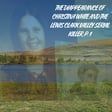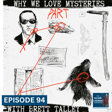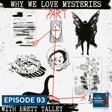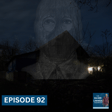
95. Grief, Ghosts and Love that Is Persistent with Chris Soucy
What do love and grief have in common? They are both eternal. Chris Soucy joins us to discuss the connection between grief, love and ghosts. We explore literature, movies, European, Black and Native cultures and paranormal experiences to examine the common threads between these things in society and culture. We discuss hope we can find in being touched by those who are gone.
Chris is the co-host of The Most Haunted City on Earth podcast, which you can find here:
https://www.hauntedcitypodcast.com/
Check out The Most Haunted City on Earth podcast Patreon at:
https://www.patreon.com/savannahunderground
Check out the Silver Linings Handbook website at:
https://silverliningshandbook.com/
Check out our Patreon to support the show at:
https://ww.patreon.com/thesilverliningshandbook
Join our Facebook Group at:
https://www.facebook.com/groups/1361159947820623
Visit the Silver Linings Handbook store to support the podcast at:
https://www.bonfire.com/store/the-silver-linings-handbook-podcast-store/



















